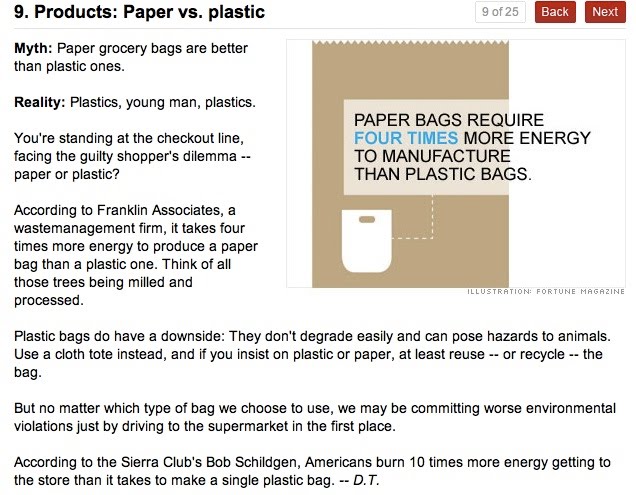This blog was originally posted on rhizomicon
Money/CNN has a feature on 25 green myths debunked. I tend to take issue with features like this, no matter what the focal issue is, since it tries to reduce often complex matters to a simple pithy paragraph or two. More often than not, the answer to the “myth” like with many things is that “it depends”. I dislike “it depends” as an answer. I had a boss who thought that was an answer he often looked for, but he tended to be a wishy-washy sort who was more talk than walk.
Many of the 25 aren’t controversial in the least, such as debunking of the myth that “bottled water is safer than tap”. The main problem I have is that by calling something a “myth” and providing equivocal evidence, i.e., “it depends” answers, frames an environmental issue in a way that could turn people away from something that may have potential in the future to be green or actually is green in certain contexts. I wish these articles would go into greater depth on the issues behind what makes them “myths” and get people to think about how their choices fit in with their values.
The paper versus plastic bag issue can get pretty complicated if you factor in all the variables, but the Money/CNN snippet was right in saying that no matter which you choose, at least re-use or recycle the bag or better yet, use a canvas bag. The problem I have is that the article focuses on the energy used to create a plastic versus paper bag. Well, not all energy is created equal. If there’s a pulpmill or recycling plant in an area that uses hydroelectric {e.g., British Columbia or the US Pacific Northwest}, that’s likely to beat a plastic bag factory using coal, despite a 4:1 energy use ratio that favours paper. So, the issues should be::
- relative weight {transportation energy}
- energy to produce and transport the bags and lifecycle carbon footprint
- biodegradability {although landfills emphasize stability, not biodegradation}
- harm to wildlife in the natural environment
- use of a renewable versus non-renewable resource
- use, durability, and cost of compostable plastics vs. regular plastic bags and paper bags
This reason.org article has more complexity, yet comes to the same conclusions as the CNN/Money article. Nevertheless, how does one make tradeoffs between energy used to produce a bag and the fact that it’s made from a renewable or non-renewable resource. Sometimes these things will come down to personal values.
I think many people want to do the right thing, to the extent of their values system. I understand that all of these articles are trying to give consumers decision short-cuts {heuristics} on these green issues, but in many of the issues are framed in a way that obfuscates how personal values can factor in.
I still get “crap” for using all sorts of plastic bags for used kitty litter that goes into the Toronto wet waste bin. Somehow, I get a great deal of satisfaction “creating” whole wheat pitas and Mini-wheats from catbox beach, but that’s another story.
Song:: Björk-‘Nattúra’
Twitterversion:: 25 green myths debunked, although care should be taken in taking some of the recommendations. #ThickCulture http://url.ie/64jk @Prof_K


Comments